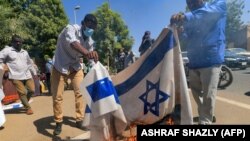Monday’s protest comes after Israeli Foreign Affairs Minister Eli Cohen met with Sudanese officials in Khartoum and announced that the two countries are normalizing ties and moving towards a “peace agreement.”
Sudanese protesters chanted “no normalization” with Israel, as they held banners blaming Sudanese military leader Abdel Fattah al-Burhan for committing a “betrayal.”
Speaking to VOA during Monday’s protest, Mohammed Al Safi said, he rejects any form of normalization with Israel.
Al Safi, who is a member of the self-described “popular campaign” against normalization with Israel, said al-Burhan's decision doesn’t reflect the will of the Sudanese people.
“We are at the Ministry of Foreign Affairs to raise our voice that Khartoum shall remain the town for ‘No to peace, no to normalization and no to recognition of Israel,’” he said.
That policy, known as the Three Nos, was established at a 1967 Arab League summit in Khartoum, soon after the 1967 Mideast War when Israel took control of Jerusalem and the West Bank.
Another protester, Tamadur Omer, said she took part in the protest to reject the “illegality” of the decision taken by the Sudanese military leaders.
Speaking to VOA while wearing a Palestinian scarf around her neck, she said her religion doesn’t allow her to live in peace with the Israeli people. That is why the government’s decision doesn’t serve the interest of all Sudanese people.
“As a Muslim, I reject the normalization in principle and value,” she said. “And as a Sudanese people, we will not sell our country to Zionists. Such a decision can only be the mandate of an elected and a legitimate government.”
Another demonstrator, Al Fadil Abu Basher, said protesters will push to maintain the rejection of any ties with Israel.
"This is an unconstitutional and illegal decision and they, the military, do not have the right to take such a decision,” he said. “We are ready to face the illegal step with all the rejection [it] means. All means are open for us.
Abdulrahman Khaleel, the spokesperson of the Sudanese Foreign Affairs Ministry, downplayed the protest, saying people are free to demonstrate.
“It is normal that part of the Sudanese are against this. They have a right to express their opinion,” he said.
In 2020, the United Arab Emirates, Bahrain and Morocco all normalized relations with Israel as part of the U.S.-brokered Abraham Accords. Sudan separately announced plans to establish diplomatic ties with Israel in a deal brokered by the administration of former U.S. President Donald Trump.
In January 2021, Sudan’s government issued a declaration paving the way to normalizing ties with Israel, and later approved a bill abolishing a boycott of the country dating back to 1968.






